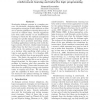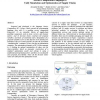1559 search results - page 24 / 312 » The Semantics of Future and Its Use in Program Optimizations |
108
click to vote
IPPS
2008
IEEE
15 years 8 months ago
2008
IEEE
We present an auto-tuning approach to optimize application performance on emerging multicore architectures. The methodology extends the idea of searchbased performance optimizatio...
139
click to vote
PLDI
2011
ACM
14 years 4 months ago
2011
ACM
Translation validators are static analyzers that attempt to verify that program transformations preserve semantics. Normalizing translation validators do so by trying to match the...
138
click to vote
IDT
2010
15 years 13 days ago
2010
Humans know how to reason based on cause and effect, but cause and effect is not enough to draw conclusions due to the problem of imperfect information and uncertainty. To resol...
123
click to vote
NAACL
2001
15 years 3 months ago
2001
Developing dialogue systems is a complex process. In particular, designing efficient dialogue management strategies is often difficult as there are no precise guidelines to develo...
125
click to vote
HICSS
2008
IEEE
15 years 8 months ago
2008
IEEE
Proposed and developed is the language Service Composition (SC) CoJava, which extends the programming language Java with (1) a modular service composition framework; (2) an extens...


